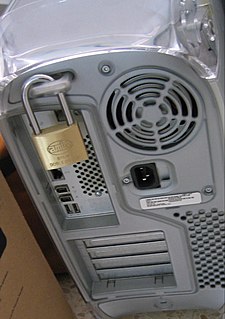
Computer security, cybersecurity or information technology security is the protection of computer systems and networks from information disclosure, theft of or damage to their hardware, software, or electronic data, as well as from the disruption or misdirection of the services they provide.
Cybercrime, or computer crime, is a crime that involves a computer and a network. The computer may have been used in the commission of a crime, or it may be the target. Cybercrime may harm someone's security and financial health.

Trend Micro Inc. is an American-Japanese multinational cyber security software company with global headquarters in Tokyo, Japan and Irving, Texas, United States, with regional headquarters and R&D centers in Asia, Europe, and North America. The company develops enterprise security software for servers, containers, & cloud computing environments, networks, and end points. Its cloud and virtualization security products provide automated security for customers of VMware, Amazon AWS, Microsoft Azure, and Google Cloud Platform.
The Australian High Tech Crime Centre (AHTCC) are hosted by the Australian Federal Police (AFP) at their headquarters in Canberra. Under the auspices of the AFP, the AHTCC is party to the formal Joint Operating Arrangement established between the AFP, the Australian Security Intelligence Organisation and the Computer Network Vulnerability Team of the Australian Signals Directorate.
Ransomware is a type of malware from cryptovirology that threatens to publish the victim's data or perpetually block access to it unless a ransom is paid. While some simple ransomware may lock the system so that it is not difficult for a knowledgeable person to reverse, more advanced malware uses a technique called cryptoviral extortion. It encrypts the victim's files, making them inaccessible, and demands a ransom payment to decrypt them. In a properly implemented cryptoviral extortion attack, recovering the files without the decryption key is an intractable problem – and difficult to trace digital currencies such as paysafecard or Bitcoin and other cryptocurrencies are used for the ransoms, making tracing and prosecuting the perpetrators difficult.
Brian Krebs is an American journalist and investigative reporter. He is best known for his coverage of profit-seeking cybercriminals. His interest grew after a computer worm locked him out of his own computer in 2001.
Bitdefender is a Romanian cybersecurity technology company headquartered in Bucharest, Romania, with offices in the United States, Europe, Australia and the Middle East.
Recorded Future is a privately held cybersecurity company founded in 2009 with headquarters in Somerville, Massachusetts. The company specializes in the collection, processing, analysis, and dissemination of threat intelligence. Recorded Future uses patented machine learning and natural language processing methods to continuously collect and organize data from open web, dark web, and technical sources. The resulting information is displayed within a software-as-a-service portal.

F. William Conner is an American business executive.
Cyber crime, or computer crime, refers to any crime that involves a computer and a network. The computer may have been used in the commission of a crime, or it may be the target. Netcrime refers, more precisely, to criminal exploitation of the Internet. Issues surrounding this type of crime have become high-profile, particularly those surrounding hacking, copyright infringement, identity theft, child pornography, and child grooming. There are also problems of privacy when confidential information is lost or intercepted, lawfully or otherwise.
There is no commonly agreed single definition of “cybercrime”. It refers to illegal internet-mediated activities that often take place in global electronic networks. Cybercrime is "international" or "transnational" – there are ‘no cyber-borders between countries'. International cybercrimes often challenge the effectiveness of domestic and international law and law enforcement. Because existing laws in many countries are not tailored to deal with cybercrime, criminals increasingly conduct crimes on the Internet in order to take advantages of the less severe punishments or difficulties of being traced. No matter, in developing or developed countries, governments and industries have gradually realized the colossal threats of cybercrime on economic and political security and public interests. However, complexity in types and forms of cybercrime increases the difficulty to fight back. In this sense, fighting cybercrime calls for international cooperation. Various organizations and governments have already made joint efforts in establishing global standards of legislation and law enforcement both on a regional and on an international scale. China–United States cooperation is one of the most striking progress recently, because they are the top two source countries of cybercrime.

The Cyber Intelligence Sharing and Protection Act was a proposed law in the United States which would allow for the sharing of Internet traffic information between the U.S. government and technology and manufacturing companies. The stated aim of the bill is to help the U.S. government investigate cyber threats and ensure the security of networks against cyberattacks.
Operation Tovar is an international collaborative operation carried out by law enforcement agencies from multiple countries against the Gameover ZeuS botnet, which is believed by the investigators to have been used in bank fraud and the distribution of the CryptoLocker ransomware.
The following outline is provided as an overview of and topical guide to computer security:

David "Dave" Venable is a former intelligence officer with the United States National Security Agency, and current cyber security professional and businessman. He is an author and speaker on the topics of cyber security, cyberwarfare, and international security; has developed security-related internet protocols; is a US patent holder; and has been named as one of the most influential people in security.

The WannaCry ransomware attack was a worldwide cyberattack in May 2017 by the WannaCry ransomware cryptoworm, which targeted computers running the Microsoft Windows operating system by encrypting data and demanding ransom payments in the Bitcoin cryptocurrency. It propagated through EternalBlue, an exploit developed by the United States National Security Agency (NSA) for older Windows systems. EternalBlue was stolen and leaked by a group called The Shadow Brokers at least a year prior to the attack. While Microsoft had released patches previously to close the exploit, much of WannaCry's spread was from organizations that had not applied these, or were using older Windows systems that were past their end-of-life. These patches are imperative to an organization's cyber-security but many were not applied because of needing 24/7 operation, risking having applications that used to work break, inconvenience, or other reasons.

Petya is a family of encrypting malware that was first discovered in 2016. The malware targets Microsoft Windows–based systems, infecting the master boot record to execute a payload that encrypts a hard drive's file system table and prevents Windows from booting. It subsequently demands that the user make a payment in Bitcoin in order to regain access to the system. The Petya malware had infected millions of people during its first year of its release. The maker of the Petya malware was arrested and fined.
William "Chuck" Easttom II is an American computer scientist specializing in cyber security.
This is a list of cybersecurity information technology. Cybersecurity is security as it is applied to information technology. This includes all technology that stores, manipulates, or moves data, such as computers, data networks, and all devices connected to or included in networks, such as routers and switches. All information technology devices and facilities need to be secured against intrusion, unauthorized use, and vandalism. Additionally, the users of information technology should be protected from theft of assets, extortion, identity theft, loss of privacy and confidentiality of personal information, malicious mischief, damage to equipment, business process compromise, and the general activity of cybercriminals. The general public should be protected against acts of cyberterrorism, such as the compromise or loss of the electric power grid.







